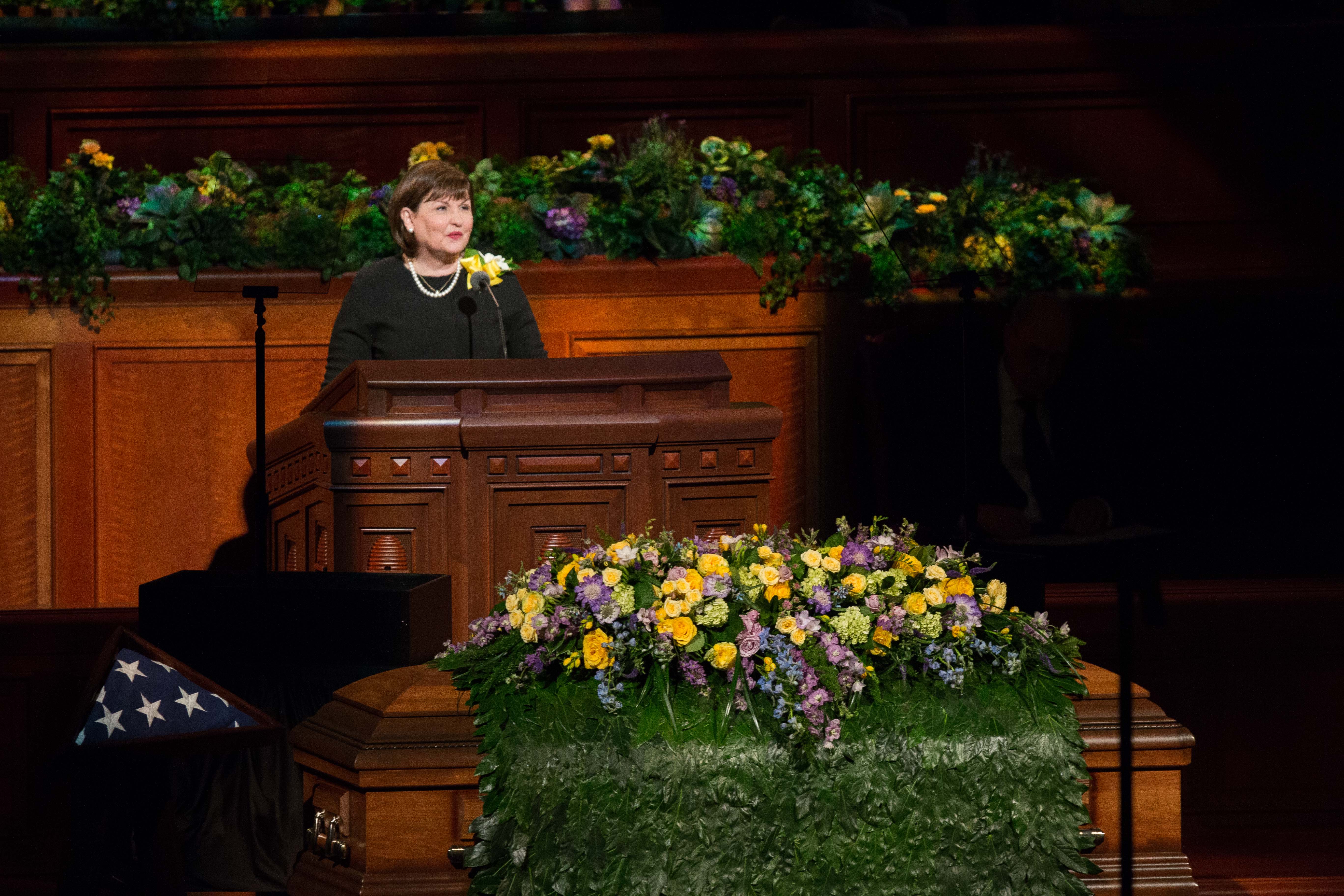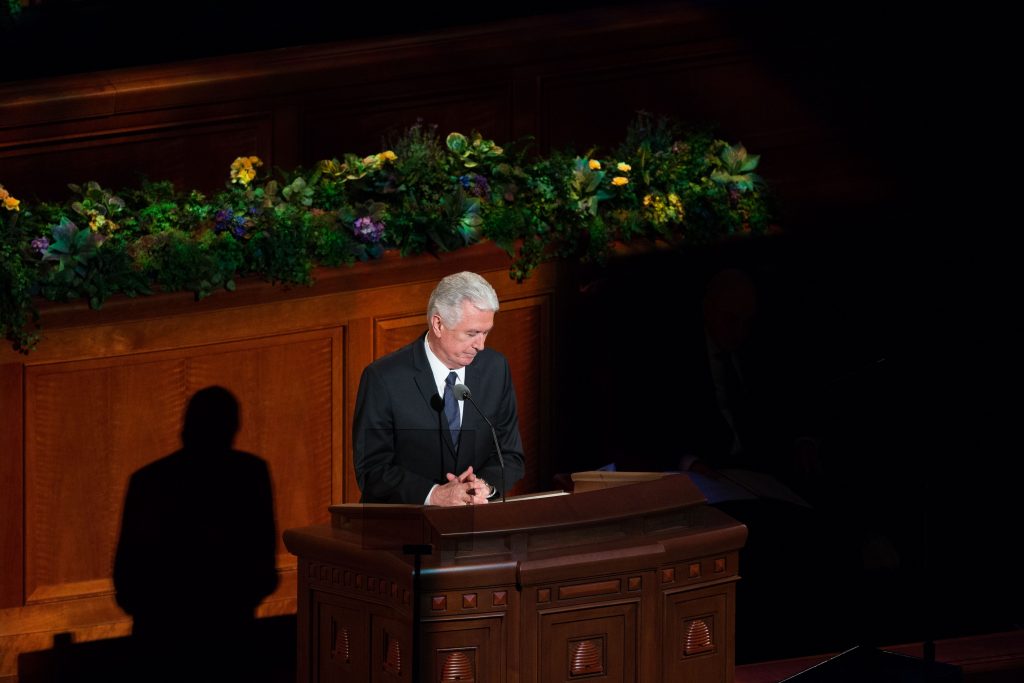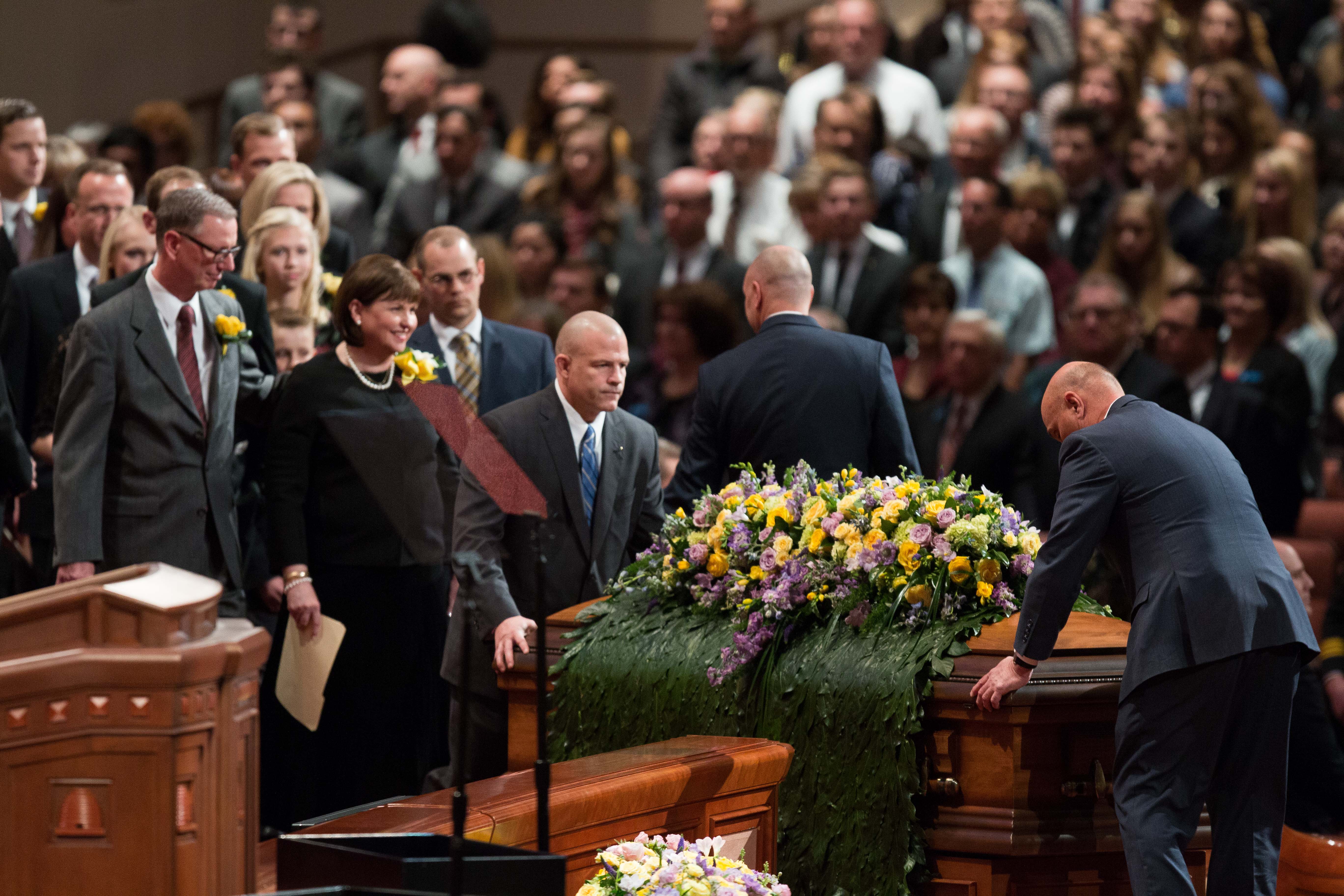
A hush fell over the Conference Center and the congregation stood as a procession of pallbearers carried President Thomas S. Monson’s casket, covered in yellow and lavender roses, to the stand.
It was a fitting moment of respect for a man beloved by church members worldwide.
President Henry B. Eyring conducted the funeral. Following the Mormon Tabernacle Choir singing “Consider the Lilies,” Elder M. Russell Ballard of the Quorum of the Twelve Apostles offered the invocation.
Sister Ann M. Dibb, President Monson’s daughter, spoke about her father’s legacy of love and service. In particular, she focused on the way President Monson reached out to “the one” — visiting friends and strangers alike and inviting people to “paint a bright spot upon (their) souls” through service.
“Through his devoted service, he had learned that joy comes from loving the Lord and serving your neighbor,” Sister Dibb said. “This joy is available to each of us. There is no better way to honor my father, the prophet and our Savior Jesus Christ than to live every day so that at its close we can truly say, ‘I feel I’ve done some good today.’”

Following the choir’s rendition of “O Divine Redeemer,” President Dieter F. Uchtdorf spoke of the ways he was personally blessed by President Monson, as well as President Monson’s impact on President Uchtdorf’s native Germany during the Cold War years.
President Monson brought suitcases of clothes and other necessities to members in East Germany, offered an apostolic prayer for the country in 1975 and even visited a bedridden member on the fifth floor of a building without elevators, despite having recently undergone foot surgery.
“President Monson was truly a prophet for our time,” President Uchtdorf said. “He was a man for all seasons. All that we know and love about President Thomas S. Monson will continue.”
President Eyring spoke with increasing emotion as he continued the theme of President Monson’s personal ministry of service. President Eyring bore his testimony that President Monson, as well as all those who come into mortality, will be resurrected.
“(President Monson) was loved by those who knew him from his stirring and inspiring talks and his leadership,” President Eyring said. “The number of individuals who loved him through his personal kindnesses is known only to the God who sent him to care for them.”
The choir then sang “Dear to the Heart of the Shepherd,” reflecting the themes of compassionate service found in the spoken tributes to President Monson.
Speaking at times with tears in his eyes, President Russell M. Nelson added his witness that though those who loved President Monson will have sorrow for a time, the Atonement makes their bereavement bearable.
He also highlighted the growth President Monson brought to the church since he became an apostle in 1963, from church membership rising from 2.1 million to 16 million, to the missionary ranks growing from 5,700 to over 70,000.
Despite all this, “President Monson never sought the limelight,” President Nelson said.
“In a world now saturated with ‘selfies,’ he modeled selflessness,” President Nelson said. “Even in his waning season, he continued to minister, making frequent visits to hospitals and senior centers.”

President Nelson also shared the story of a “critical meeting” on Oct. 28, 1988, in the German Democratic Republic, where President Monson explained to the country’s chairman of the council why missionaries would be good for Germany. The chairman responded that the council had come to trust President Monson after watching him for many years, and they would approve missionaries coming into the country.
President Nelson closed with his testimony that President Monson was a prophet of God.
“He taught as a prophet and testified as a prophet,” President Nelson said. “He had the courage of a prophet and the kindness of a prophet. He lived as a prophet and died as a prophet, sealing with his life his testimony that God lives, that Jesus is the Christ, that his church has been restored to the earth and that this sacred work is true.”
The choir then sang “If the Way Be Full of Trial, Weary Not.” The benediction was given by Elder Jeffrey R. Holland, and following the funeral, a private procession left for the grave dedication and interment at the Salt Lake City Cemetery. The grave was dedicated by Thomas L. Monson, President Monson’s son.
Carissa Yang, an international student from Taiwan, said attending the funeral allowed her to ponder how God speaks to people through prophets.
“I have been thinking about this and my personal responsibility, and what I’m supposed to do to be a better person,” she said.
Tomasi Lautaha from Tonga spoke of being blessed by President Monson and other church leaders during his time as a missionary.
“(President Monson)’s my hero on the island,” he said.
BYU students shared the impact President Monson had on their lives. Watch the 6-part video series below.




